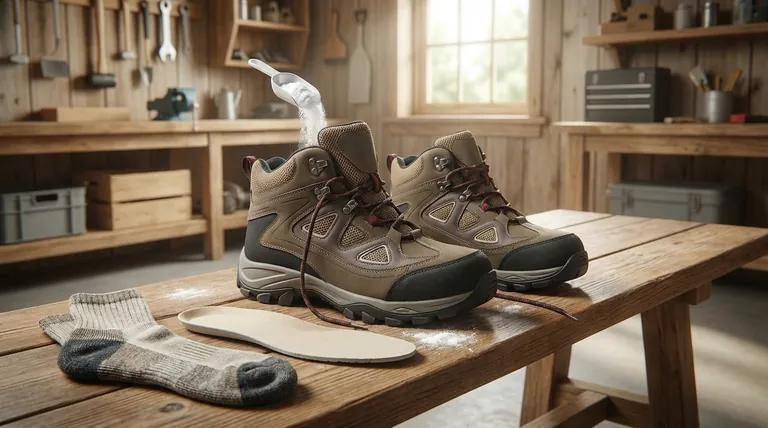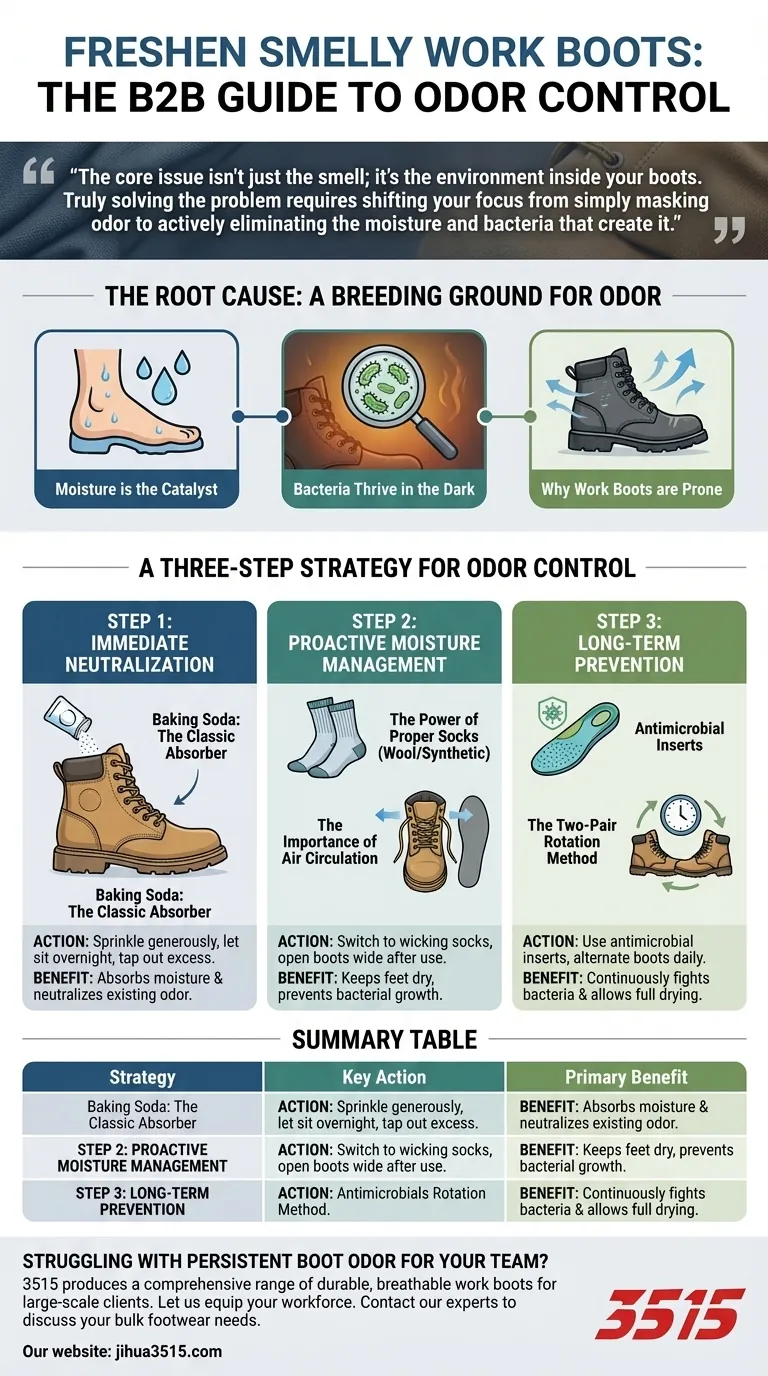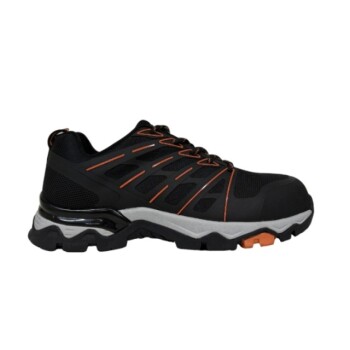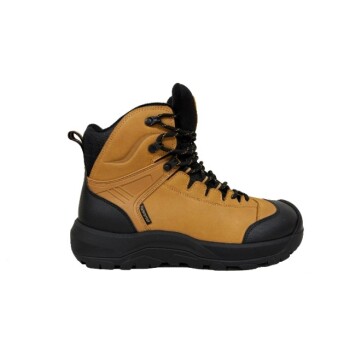To effectively freshen smelly work boots, you must first neutralize the existing odor and then prevent the moisture that allows odor-causing bacteria to thrive. The most immediate solution is to sprinkle baking soda inside the boots overnight to absorb smells, while a long-term strategy involves wearing moisture-wicking socks and using antimicrobial inserts.
The core issue isn't just the smell; it's the environment inside your boots. Truly solving the problem requires shifting your focus from simply masking odor to actively eliminating the moisture and bacteria that create it in the first place.

The Root Cause: A Breeding Ground for Odor
Before you can fix the problem, you need to understand why it happens. A work boot provides the perfect conditions for bacteria and fungus to multiply.
Moisture is the Catalyst
Your feet produce a significant amount of sweat, especially during a long day of physical work. This moisture gets trapped inside the boot with nowhere to go.
Bacteria Thrive in the Dark
The warm, dark, and damp environment inside your boot is an ideal breeding ground for the bacteria that feed on sweat and dead skin cells. The byproduct of this bacterial activity is what causes the unpleasant odor.
Why Work Boots are Prone to Odor
Many work boots are made from durable, less-breathable materials like thick leather or rubber for safety and support. This construction, while protective, severely limits air circulation and traps heat and moisture effectively.
A Three-Step Strategy for Odor Control
A comprehensive approach involves neutralizing current odors, managing daily moisture, and preventing future bacterial growth.
Step 1: Immediate Odor Neutralization
Your first priority is to tackle the existing smell. This is the fastest way to get immediate relief.
Baking Soda: The Classic Absorber
Baking soda is a simple and highly effective desiccant and deodorizer. It works by absorbing excess moisture and neutralizing acidic odors.
Simply sprinkle a generous amount of baking soda directly into each boot. Ensure it coats the entire insole, then let them sit overnight. In the morning, tap the boots firmly to remove all the excess powder before wearing them.
Step 2: Proactive Moisture Management
Once the immediate odor is gone, the next step is to control the environment that created it.
The Power of Proper Socks
Cotton socks are a major contributor to boot odor because they absorb and hold sweat against your skin.
Switch to socks made from wool or synthetic antimicrobial fibers. These materials wick moisture away from your feet, keeping them drier and making the boot environment less hospitable to bacteria. Always start the day with a clean, dry pair.
The Importance of Air Circulation
Never leave your boots tied up in a bag or closet after work. As soon as you take them off, loosen the laces, pull out the insoles, and open the tongue as wide as possible to promote airflow and drying.
Step 3: Long-Term Prevention
The final step is to implement a system that continuously fights the causes of odor.
Antimicrobial Inserts
For persistent odor, standard insoles are not enough. Antimicrobial inserts are designed with materials that actively inhibit the growth of bacteria and fungus, providing a constant defense against odor.
The Two-Pair Rotation Method
This is one of the most effective professional strategies. Boots need more than one night to dry out completely. By owning two pairs and alternating them daily, you ensure each pair has a full 24 hours to air out, completely eliminating the moisture buildup that bacteria need to survive.
Understanding the Limitations and Pitfalls
While these methods are effective, it's important to recognize their limitations to avoid common frustrations.
Baking Soda Isn't a Permanent Fix
Baking soda is excellent for absorbing existing moisture and odor, but it does not kill the source bacteria. If you don't address the underlying moisture problem, the smell will return quickly.
Sprays Often Mask, Not Solve
Many commercial foot sprays simply cover up the smell with a stronger fragrance. While they may offer temporary relief, they do not solve the root cause and can sometimes contribute to more moisture inside the boot.
Ignoring the Root Cause is Futile
If you only treat the smell without changing your sock material or allowing your boots to dry properly, you will be stuck in a constant cycle of deodorizing. The only permanent solution is to create a dry internal environment.
Making the Right Choice for Your Situation
Use this guide to select the strategy that best fits your immediate need and long-term goals.
- If you need a quick fix for tomorrow morning: Use the baking soda method overnight to absorb the worst of the odor.
- If you face persistent, daily odor: The most impactful change is to combine moisture-wicking wool socks with a two-pair boot rotation system.
- If you want the most powerful, low-effort solution: Invest in high-quality antimicrobial or cedar inserts that actively fight odor-causing bacteria.
By shifting from simply treating odor to actively preventing moisture, you can take permanent control of your work boot environment.
Summary Table:
| Strategy | Key Action | Primary Benefit |
|---|---|---|
| Immediate Relief | Sprinkle baking soda overnight | Absorbs moisture & neutralizes existing odor |
| Daily Management | Wear moisture-wicking socks | Keeps feet dry, preventing bacterial growth |
| Long-Term Prevention | Use antimicrobial inserts & rotate boots | Continuously fights bacteria & allows boots to dry fully |
Struggling with persistent boot odor for your team? As a large-scale manufacturer, 3515 produces a comprehensive range of durable work boots and footwear for distributors, brand owners, and bulk clients. Our boots are designed with materials and construction that prioritize breathability and long-term comfort. Let us help you equip your workforce with high-quality footwear that stands up to the toughest conditions. Contact our experts today to discuss your bulk footwear needs and find a lasting solution.
Visual Guide

Related Products
- Safety Footwear Wholesale Manufacturer for Custom OEM/ODM Production
- Wholesale Safety Footwear Manufacturer for Bulk & Custom OEM Orders
- Wholesale Anti-Smash & Puncture-Proof Safety Shoes Custom Manufacturing for Brands
- Premium KPU Injection Athletic Style Safety Shoes
- Wholesale Leather Safety Boots with Customizable Protective Toe
People Also Ask
- What are the differences between steel toe, composite toe, and alloy toe Wellington boots? Choose the Right Safety Toe for Your Job
- How do safety shoes contribute to cost savings for companies? A Strategic Investment in Risk and Cost Management
- How long can you wear safety boots? The Lifespan is Determined by Wear, Not Time
- What are OSHA approved shoes? Understanding the Correct Standards for Workplace Safety
- What are the cultural perspectives on wearing shoes in the house? A Guide to Home Etiquette & Hygiene



















